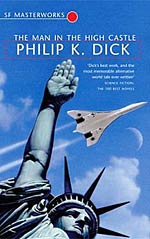
![]() hillsandbooks96
hillsandbooks96
7/8/2025
![]()
I think the reason people sometimes find themselves disappointed by this book is that they are attracted to the premise, or they've seen the TV show and expect a focus on the alternate history. The important thing to understand is that the alternate history conceit here is frankly secondary and arguably not that important; it is really just used as a means to explore the ideas of what is real/what is fake and the concept of alternate realities. So if you're looking for a thriller set in a victorious Nazi Reich akin to the television adaptation, you'll be disappointed.
The story follows a number of characters in an alternate Axis-dominated world (specifically the US) but of course, this being Philip K. Dick, nothing is as it seems. One of the characters sells antiques and old Americana to wealthy Japanese clientele who seek to collect pre-war memorabilia, and the ideas of authenticity and historicity naturally are raised in what is a fantastically original way to explore the idea of alternate or parallel history.
Most if not all of the major characters make use of the 'I Ching', a real-life Chinese book of divination which involves the characters making their decisions through nothing more than chance and consulting the oracle. Again, the question of chance, what if someone had made the other decision and how would that affect history, raises its head. That Dick used the I Ching to write The Man in the High Castle, and the author of the book-within-a-book The Grasshopper Lies Heavy also used it, begs the question: is our world any more real to us than the characters' is to them?
Despite only being given scant details of this Nazi-dominated world, PKD manages to paint a chilling and effective vision of what could have been, if only chance or fate had been different. And that really is the main takeaway from this novel.
https://www.goodreads.com/user/show/158820077-dan-roebuck